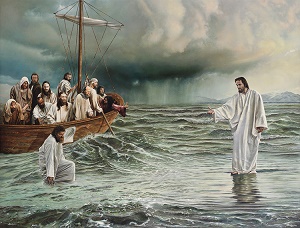August 9, 2020
Nineteenth Sunday in Ordinary Time, Year A
First Reading: 1 Kings 19:9, 11-13
Second Reading: Romans 9:1-5
Gospel: Matthew 14:22-33
The first reading today narrates the story of Elijah the prophet and how God showed him His presence. By 860 BC in the Northern Kingdom of Israel, Ahab was king. His wife Jezebel was overbearing and controlling. Remember God had asked His people not to marry from the pagan nations. Exodus 34: 16 says if you accept pagan daughters who sacrifice to other gods as wives for your sons, they will seduce your sons to commit adultery against me by worshiping other gods. Jezebel was from Tyre. Influenced by her, Ahab built temples for the worship of Baal throughout Israel. As the Latin says, “cuis regio, eius religio,’ a phrase which literally means “whose realm, his religion,’ and means that “the religion of the king dictates the religion of the rules.” And so Ahab led Israel to worship Baal. When Jezebel was on a journey, Elijah seized the opportunity to challenge the prophets of Baal and killed all of them. We are very familiar with the story.
Upon her return she learnt what Elijah had done and was enraged. Just when Elijah should have been triumphant, he receives a message telling him of Jezebel’s murderous intentions, and he is afraid to die in the hands of Jezebel. This spectacularly powerful servant of God who was at the height of success in chapter 18 is now in chapter 19 in the depths of despair and completed deflated. It was a dark night of the soul. In the midst of his frustration at his apparent failure, the feeling of being alone and abandoned, the feeling of being defeated, he fled the land. Then God showed Himself to him. He showed His presence not in the mighty winds shattering the rocks, not in the earthquake or any spectacular events but in the sound of a gentle breeze. Though spectacular phenomena, such as wind, storms, earthquakes and fire may indeed herald the divine presence as we see in Exodus 19:18-19 they do not constitute the presence itself. The Hebrew expression “still small voice” literally means “a voice of low whispers, a sound of gentle stillness.” Though Jezebel was thundering and making noise, she was not in control. Though God was silent, He was present and in control. The forces of evil may roar and thunder, they may spit fire, but they are empty. Elijah’s God and our God is the God of signs and wonders but He is also the God of whispers and gentleness. It is only when Elijah’s mind and heart are finally depleted of ambition and self-promotion, is God ultimately heard. It is only when our hearts are quiet that we can hear the whispering sound of God’s voice.

The Gospel presents us another divine manifestation at a moment of difficulty and trial. We see Jesus walking on the water towards his disciples who were troubled by the tempest. All synoptic Gospels place this event immediately after the miracle of the feeding of the 5000. The location is the Sea of Galilee which is said to be 7 miles wide in its widest point, a place of fishing which the disciples knew very well. Matthew tells us that it happened while they were far from the land. John’s account is more specific. He says when they had rowed 3 or 4 miles, they saw Jesus walking on the sea and drawing near to their boat. Why this is important is that some sceptics argue that Jesus was walking on shallow waters and some say it was on the bank of the river. They are in the middle of the lake in the middle of the night. Some may ask why night? Perhaps to avoid the prying eyes of the people. Keep in mind that as fishermen they were also used to rowing in the night. Remember when they spent all night and caught no fish. They were caught up in a terrible storm. They are also used to storms but what they are not used to is being in the middle of the sea in the middle of the night and seeing a man walking on the waves of the sea towards them.
When they experienced this their first reaction is fear. They assume it is a ghost. But Jesus says something interesting, “courage! It is I! Do not be afraid! The fathers of the Church see in this response of Jesus a clue that warrants its characterization as a theophany. Theophany means the appearance of God, the revelation of His power and presence in the world. In all the accounts of theophany in the Bible, the people’s first reaction is always fear and God’s response is always ‘be calm,’ ‘do not be afraid.’ Then comes reverence or worship. Jesus said, do not be afraid it is I. The original Greek text says “egό eimi” which literally means “I am.” This response would have reminded the disciple as well as the first century readers of Matthew of the most famous theophany in the Old Testament, when God appeared to Moses and sent him to go to Pharaoh and save His people. Moses asked him who he is to say is sending him, God said, I am has sent you, this will be my name for all generations. When we take Jesus’s words, ‘do not be afraid’ and His use of the divine name, “I am,” it becomes clear that Jesus is revealing His divinity to his disciples. Notice what they did when He entered the boat; they bowed down before Him and said, “Truly, you are the Son of God.”
Before Jesus entered the boat something very interesting happened. Peter said, “Lord if it is you, tell me to come to you across the water.” Jesus said come. Peter walked on the water, but feeling the wave of the water and beginning to give in to fear, he began to sink. He cried out to Jesus and Jesus stretched out His hands and saved him. This part of the story reveals something very important about us. Like Peter and Elijah in the first reading, we always begin with enthusiasm and great faith and ready to walk on water when God commands it but too often, we give in to fear in the midst of trials and difficulties and we begin to sink and cry for help. The Good News is that always near to us, He has compassion for us and is ready to help us if we call upon Him.
That the all-powerful God, creator of heaven and earth and of all things that are, chooses to manifest Himself to Elijah not a tiny whispering sound rather than by more dramatic means encourages us to be mindful of God’s presence even in what is small, simple and seemingly insignificant. The appearance of Jesus to His disciples while they battled the waves teaches us His nearness to us at the most difficult times. Let us reflect today on our need to trust in God’s abiding presence even in the most challenging circumstances.
Happy Sunday

Fr. Chidi Onwuka M.Ss.Cc

Good afternoon father,
Thank you Father for the gospel message today telling us that we should look up to Jesus when we are in trouble and trial as Peter did in today’s Gospel rather than looking for help from false prophets and charms.
Today’s first reading is also telling us that we should utilize every opportunity we have, as Elijah did . How he used the time when Jezebel wasn’t around to prove to the people of Israel that our God is a God of signs and wonder and God who answers by fire.